Another Rare Asiatic Cheetah Killed In Car Accident In Iran
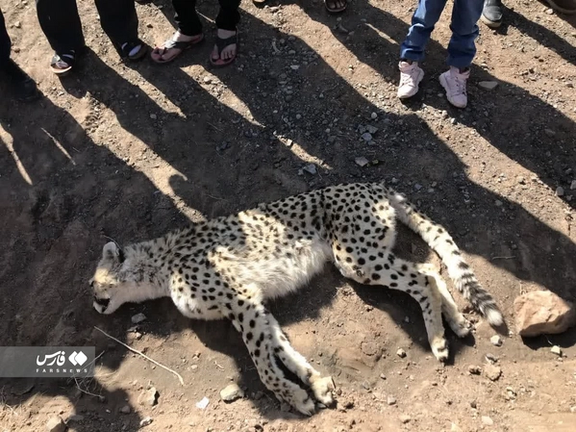
Iranian officials say another Asiatic cheetah has been killed in a car accident near the city of Miami in Semnan Province, east of Tehran.

Iranian officials say another Asiatic cheetah has been killed in a car accident near the city of Miami in Semnan Province, east of Tehran.
Director General of Environmental Protection of Semnan province, Bahram Ali Zahiri said Sunday that in the autopsy performed on the dead cheetah, it was revealed that she was pregnant with three cubs.
The Asiatic cheetah is a critically endangered subspecies currently only surviving in Iran. It lives in protected areas in the eastern-central arid region of Iran, where the human population density is very low.
In December 2017, fewer than 50 individuals were thought to be remaining in three subpopulations that are scattered over 140,000 km2 (54,000 sq mi) in Iran's central plateau.
As of January 2022, the Iranian Department of Environment estimates that only 12 Asiatic cheetahs, 9 males, and 3 females, are left in Iran.
The news agencies in Iran have reported that during the last 10 years, at least 20 cheetahs have been lost on the country’s roads.
Although 52% of recorded deaths of cheetahs are related to road accidents, Iran’s Department of Environment has not taken any action to make roads safer.
In other countries, roads have been fenced to protect animals and wide overpasses have been built in the natural habitats of animals for their safe passage.
However, Iranian officials say there is no budget allocated to erect fences around roads or install speed cameras for cars in the main habitat of Asiatic cheetah.
Iran has arrested and jailed 8 ecologists who were helping with wildlife protection on unfounded charges and after sham trials.
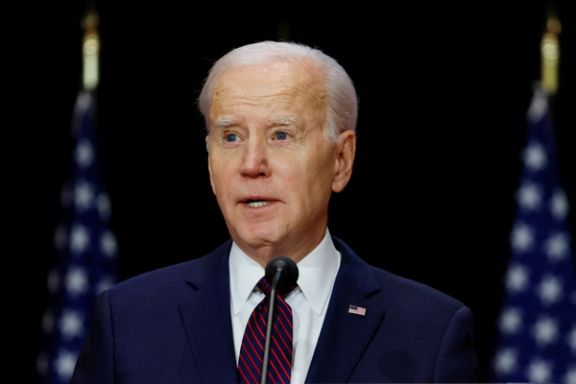
As Iran’s tit-for-tat war with the US becomes more vocal, the Biden administration’s hand is being forced to take firmer action against the regime and its proxies.
Following an Iranian attack on US troops, Gabriel Noronha, the former State Department Iran envoy tweeted: “Iran cannot match us on the escalation ladder. But as long as we play tit-for-tat with their proxies, Iran gets a pretty good deal.
“If Iran wants to kill Americans overseas and at home, we could make them pay where it hurts them: their pocketbooks.”
In a strong warning to the US, which carried out a rare strike on Iranian-linked bases in Syria last week, Iran has openly defended its militia there, its regional proxies an issue on which it prefers to stay silent.
Foreign ministry spokesperson Nasser Kanaani told state media last week: "Iran's military advisers have been in Syria at the request of the Syrian government to help this country fight terrorism, and shall remain by Syria's side to help establish peace, stability and lasting security.”
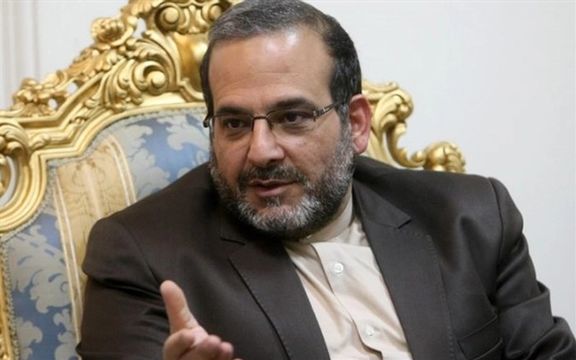
Supreme National Security Council spokesman, Keyvan Khosravi, responded with equally strongly worded threats, showing a united front in allegiance with its militia in Syria. “Any pretext to attack bases created at the request of the Syrian government to deal with terrorism and Islamic State elements in this country will be met with an immediate counter-response,” he said.
It is an interesting turnaround, not ignored by the world’s Iran watchers. Jason Brodsky, the policy director at United Against A Nuclear Iran, tweeted: “In the past these threats came from an operations room with a vague name “Allies of Syria”, which preserved plausible deniability for Tehran. But in a sign of how emboldened Islamic Republic feels Iran’s SNSC is going public quite clearly with threats.”
The Syrian Observatory for Human Rights claims the US strike killed eight pro-Iranian fighters. Thursday’s attack was one of the deadliest exchanges between the US and Iranian-aligned forces in years, retaliation for a drone drone attack that left one American contractor dead and another wounded along with five injured US troops.
Semantics on the nature of the attack were typically murky. Washington said the drone used in the attack was of Iranian origin while Iran claimed the site the US hit was ‘civilian’, a rural development centre and a grain centre near a military airport.
Speaking on a state visit to Canada last week, Biden reiterated that “the United States does not, does not seek conflict with Iran,” but said Iran and its proxies should be prepared for the US “to act forcefully to protect our people” and warned “we are not going to stop”.
Biden chooses his words carefully. While Tehran’s growing entrenchment in Syria has drawn regular Israeli air strikes, American aerial raids are rare. The US has been raising the alarm about Iran's drone program but critics say the Democrats are sitting tight to try and cling on to the last shreds of hope for reviving the nuclear deal, the JCPOA, which collapsed last year amidst Iranian intransigence.
Iran is obviously undeterred by threats to crack down on the regime’s militia, and Biden’s critics are pushing for more affirmative action.
When doing the numbers, it is clear Biden is more than reluctant to step into the military arena with Iran, which is not shy of using its proxies around the region. In spite of a recent detente with archenemy Saudi Arabia, the Houthis in Yemen have continued with military action against forces led by Saudi, which could yet jeopardize the path to peace for Iran and its powerful neighbor.
Of 78 attacks on US facilities under the Biden administration, this is a rare retaliation to have taken place. However, although US forces stationed in Syria have been attacked with drones before, deaths too, are rare, attacks more a show of force than a full-blown confrontation.
The US Department of Defense claimed its response last week was “proportionate”, aimed at minimizing casualties, while critics such as Noronha slammed it as “weak. “Just hours after the Pentagon said they were trying to minimize Iranian casualties, their forces attacked three of our bases. Weakness is deadly and provocative,” he tweeted.
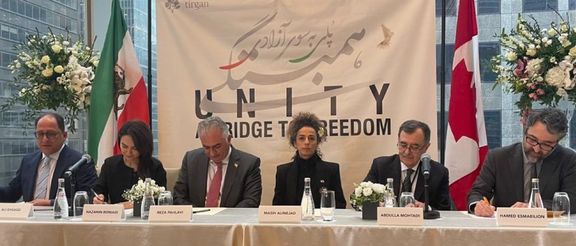
Prominent Iranian opposition figures who have joined hands to create a united front against the Islamic Republic held another event reiterating determination to end the regime.
Exiled Prince Reza Pahlavi, Canada-based activist Hamed Esmaeilion, whose daughter and wife were killed in the shooting down of Flight PS752 by Iran’s Revolutionary Guard in 2020, as well as US-based, journalist and women’s rights activist Masih Alinejad, actress and activist Nazanin Boniadi and Secretary General of Komala Iranian Kurdish party Abdullah Mohtadi held a panel in Toronto, Canada, on Saturday to discuss Iran's democracy movement.
They also delivered speeches during the street events held on the sidelines of the meeting, titled “Unity; A Bridge To Freedom.”
The group, which calls itself the Alliance for Democracy and Freedom in Iran, announced its existence in a February event at Georgetown University's Institute for Women, Peace and Security (GIWPS) -- titled ‘The Future of Iran’s Democracy Movement' and issued a Charter of Solidarity and Alliance for Freedom (Mahsa Charter) earlier in March.
Defending the contents of the Mahsa Charter, Mohtadi talked about “the spirit of pluralism” as a necessity to overthrow the Islamic Republic. He pointed out that the charter is based on minimum common grounds to defend the rights of minorities and ethnic groups, which paves the way for a transition from the Islamic Republic. He noted that the united opposition is trying to have a coalition as inclusive as possible.
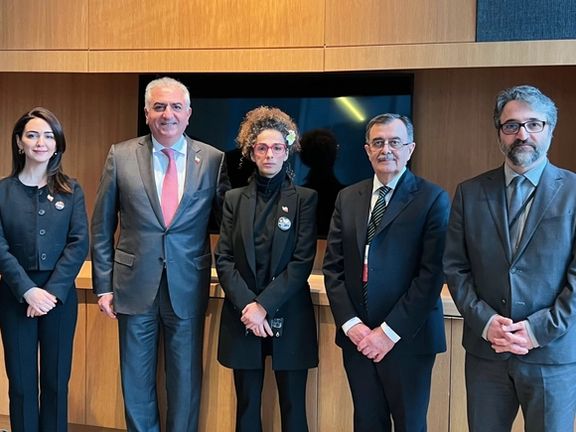
Prince Pahlavi reiterated his ideas for a democratic Iran, stressing the need for joint efforts to hold a free election in the country. "The first rule of the democratic system is to respect the ballot box,” he said.
"I firmly believe in the power of the people. Let us not underestimate the power of public opinion, because it creates the necessary motivation to feel responsible and accountable," the exiled prince said.
He said the Iranians inside the country as well as the expatriates should prove to the world that the overthrow of the regime would not leave a power vacuum in the country. “Iran will not become Syria, because we have so many capable and efficient experts inside and outside the country."
He also talked about supporting the labor strikes as the most important factor to put pressure on the regime from inside Iran, adding that experts are examining ways to create a fund to support strikes and create channels to transfer money to the striking workers.
During his speech to a crowd of Iranians who had gathered outside the venue, Pahlavi greeted Nowruz – the Persian new year that started on March 21 – expressing hope that the next Nowruz celebrations would be held in Iran, free of the regime. "We hope this will be the last Nowruz in exile and we Iranians can celebrate freedom in our own country."
Alinejad, who is known for her frank and practical views about the regime, also defended the Mahsa Charter, acknowledging that a lot of people criticized its content for some phrases that seemed not to reaffirm the territorial integrity of Iran. Emphasizing that "the most separatist person" in Iran is Supreme Leader Ali Khamenei, she said, "We have gathered together based on the minimums and we are at the beginning of a union to show a more pluralistic face of Iran."
"None of the members of the Alliance for Democracy and Freedom in Iran claim a 100-percent agreement, but we understand the power of solidarity," she said, accusing the Islamic Republic of sowing discord among the opposition to ensure its survival. "Islamic Republic has survived by separating us and turning us into wandering islands,” she added, noting that the regime has labeled Kurds and Baluchis of separatism, but Kordestan and Sistan-Baluchestan provinces have become symbols of unity representing the voice of the Iranian nation.
Esmaeilion talked about mechanisms to contact representatives of other groups and ethnicities in the united opposition front, highlighting that “this revolution will bear fruit with unity and hope.” "There is no room for despair,” he noted.
Boniadi addressed the artists and celebrities who have stood against the regime, saying that “you are our role model; we are with you, and we fight for you."

UN Special Rapporteur on Iran's human rights situation says the international community is united in ensuring that those who have committed violations and violence in Iran will be held accountable.
Javaid Rehman told Iran International on Saturday that "I'm confident Iranians will get justice", but the establishment of a precise accountability mechanism in the form of international fact-finding mission is a concrete step forward.
He said there are serious instances of violations of the rights of the people since September 16, 2022, when protests erupted, while over 500 people were killed by state authorities, including 71 children.
“Accountability must now take its course and people who have committed this very serious violations of human rights must be held accountable.”
He further noted that to bring a stop to further future serious violations of human rights in Iran the international community and global media must exert pressure on Iranian authorities to respect international law and the United Nations Human Rights Council.
Rehman also urged the Islamic Republic to allow fact-finding missions so that they can assess, investigate, and hold the perpetrators accountable.
Elsewhere in his remarks, the UN Special Rapporteur expressed support for the right of the Iranian people to protest.
“They have challenged the state authorities and they have also reached out to me to say that they are suffering, and their rights are being violated. So, I would encourage these young, brave Iranian people, and I am there for the Iranian people. I would support them,” he underlined.
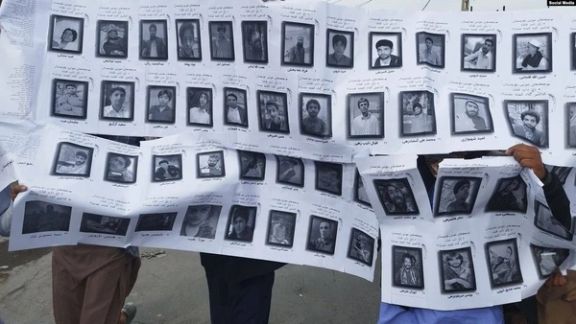
Halvash website that covers events in Iran’s Baluchestan says in its annual report that 628 Baluch citizens were killed directly or indirectly by the Islamic Republic agents in the past Iranian year that ended on March 20.
According to the report, 182 Baluch people were executed in 23 prisons across Iran, out of which about 81% were drug-related cases.
At least 167 others have lost their lives due to the direct gunfire by military agents in Sistan-Baluchistan province.
On the other hand, at least 76 citizens were victims of "violence by generally unknown armed persons" last year. Activists believe these people are mostly armed by the IRGC to conduct missions for the security organizations.
The report further added that 82 people lost their lives when smuggling fuel across the border to Pakistan. Gasoline and especially diesel are extremely cheap in Iran because of heavy government fuel subsidies. One gallon of diesel is just 4 US cents.
More than 120 protesters were killed on Bloody Friday on September 30 and during protests in the following weeks in Zahedan and Khash, the report says. On Bloody Friday in Zahedan, the provincial capital, security forces killed more than 80 people, and injured hundreds. Zahedan is one of the few Sunni-majority cities in predominantly Shiite Iran.
Since then, people in Zahedan held anti-regime protest rallies for 25 weeks in a row amid heavy presence by security forces.
Following Friday prayers every week and sermons by Sunni Baluch religious leader Mowlavi Abdolhamid, people hold demonstrations to vent anger at regime brutalities.
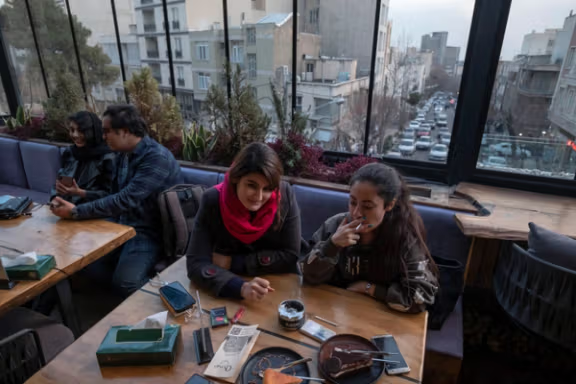
Friday imams across Iran excessively eulogized Supreme Leader Ali Khamenei and demanded tighter hijab control and enforcement of the Ramadhan restrictions.
“His highness the Supreme Leader is the best personality [created] after the Imam of the Age,” Kazem Sadighi, Friday imam of Tehran told his congregation Friday in his first sermon of the new Iranian year.
In Shiite eschatology, the twelfth imam, Mahdi, is a messianic figure thought to have been in occultation by divine will since 941 CE. He is referred to as the Imam of Ages who will appear at the end of time to cleanse the world of sin and evil. Khamenei’s devotees often refer to him as the representative of the Imam of Ages, with absolute power to rule.
Sadighi also promised that Iranians will make the world a better place under Khamenei’s banner who he said is the commander-in-chief of all of the world’s oppressed people and “the resistance front” against the world powers and “an example [for mankind], an imam, a leader and divine executive.”
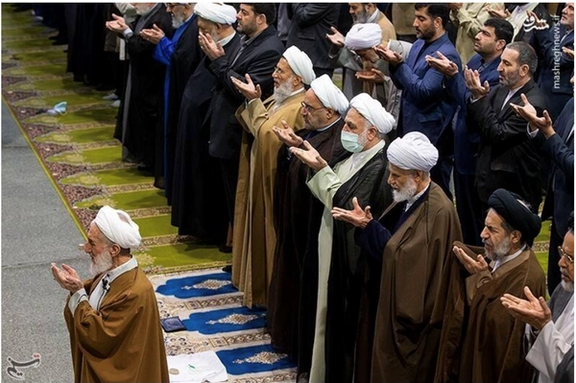
“The esteemed Leader has waged war on Satan and named this year as the year bridling inflation and boosting production,” another imam in the southern city of Shiraz, Ayatollah Lotfollah Dozhakam said in his sermon while exhorting his congregation to obey Khamenei.
“We can’t claim we are Muslims and awaiting the appearance of the Imam of Ages but do not obey his representative (Khamenei),” Dozhakam said.
Another Khamenei appointed Friday imam, Hojjat ol-Eslam Mahmoud Noorpour who also represents him in the northern Golestan Province told his congregation that hijab is “the most important institution of the Islamic Republic” and urged the authorities to enforce it at government offices, public places, hospitals and pharmacies, shops, and schools and universities.
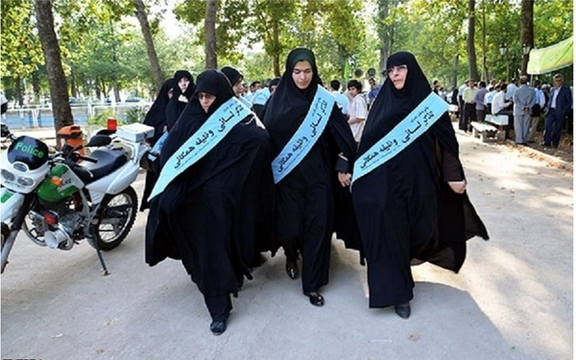
Many women have been refusing to wear the compulsory hijab since September when anti-government protests engulfed the country in reaction to the death of the 22-year-old Mahsa (Jina) Aamini in the custody of the morality police. The young woman was arrested and taken to a detention center because the morality police patrols deemed her hijab not appropriate enough.
Photos and videos posted on social media these days show many women stepping into shops and banks and riding on public transport with no headscarf. To the religious and hardline political establishment, refusal to wear the hijab is nothing short of open defiance of the regime and its ideology.
But it is not only the hijab that they are worried about these days. The month of Ramadhan has arrived. For decades, the regime has banned all eating, drinking, and smoking in public including at workplace and schools before dusk when those who fast can begin eat and drink.
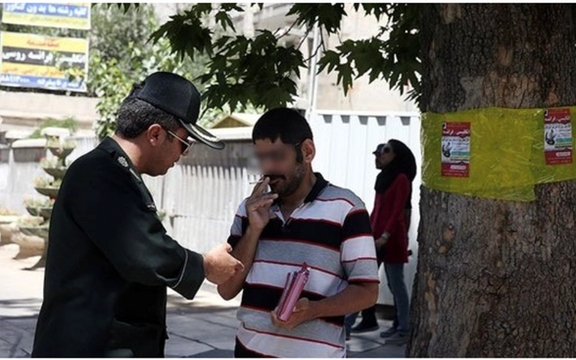
Clerics have even coined a term for the acts of eating, drinking, or smoking in public during the fasting hours which could very loosely be translated into “showing off in public that one is not fasting”. This ‘crime’ is punishable by ten to sixty days of prison or up to 74 lashes.
Even girls as young as nine are required to abide by the fasting rules at school because it is the age they are believed to be mature enough to wear the hijab and to fast. For boys the age of maturity comes much later, at fifteen.
“Respecting the holiness of the month of Ramadhan is a must for all. Showing off that one is not fasting is even worse than not fasting,” Ghorbanali Dorri-Najafabadi, the Friday imam of the city of Arak said while his peer in Gonbad, Noorpour, urged the police and state-sponsored vigilantes who are mainly responsible for warning those who do not abide by the hijab to “take decisive action against those who break the law.”